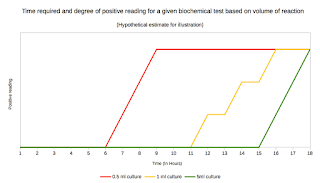First case of MCR-1 in US
 |
| Table 1: Antibiotic resistance profile. Source |
Greetings,
I have previously posted on Emergence of MCR-1 and how it's existence has been shown in multiple isolates in many different countries. The findings are hot in the international press. See my earlier posts 1, 2, 3) . According to the most recent report, an E coli carrying this gene was isolated from a urine sample from a 49 year old woman from Pennsylvania with no recent travel outside of the United States.
According to the report, the strain was an ESBL producing E coli (ST457 clone). The strain was qPCR positive for MCR-1 gene. In total, the bacterium contained 15 antibiotic-resistance genes on two plasmids. One of them plasmid was a novel IncF plasmid. It was also reported that the strain (Isolate ID- MRSN 388634) and had no genes for carbapenemases. The antibiotic resistance profile is shown in Table 1.
I wouldn't have bothered writing this piece since MCR-1 is now an old news and many countries are reporting this. This is just one case. But the media hype is too much and quite misleading. The reports all over the internet imply that this strain is totally resistant, with a fancy term- Superbug. Yes, this bug is colistin resistant, but not untreatable. As you can see from the antibiogram profile, the strain is not a CRE (Carbapenemase Resistant Enterobacteriaceae). In fact, the MIC value for Ertapenem and Meropenem is <0.25 ug/ml.
 |
| Table 2: Characteristics of plasmids in E.coli MRSN 388634. Source |
Patrick McGann, the lead author of the paper comments, "Colistin is one of the last efficacious antibiotics for the treatment of highly resistant bacteria. The emergence of a transferable gene that confers resistance to this vital antibiotic is extremely disturbing. The discovery of this gene in the U.S. is equally concerning and continued surveillance to identify reservoirs of this gene within the military healthcare community and beyond is critical to prevent its spread".
 |
| Fig 1: Google hits for keywords- "MCR-1 superbug in US" |
That brings me to a question. Will there ever be an isolate that is totally drug resistant? If you wish to give an example of TDR-TB then am sorry you are wrong. As per WHO and global consensus, Total Drug Resistance (TDR) is a misnomer since these strains are still susceptible to some antibiotics. As far as my knowledge exists (I maybe ignorant) there never has been a TDR resistance for any organism. There is no reason why this cannot happen in future. But such a probability is less. To be resistance to a huge variety of drugs the strain needs to carry a huge number of genes for it. In the case of E.coli MRSN 388634 (see Table 2), resistance is encoded in 2 plasmids for a huge set of genes. Carrying and managing so many genes is a heavy energetic toll on the organism and given a choice they will drop it. I would contest that, in this case probably carbapenemase resistance was dropped.
At this time surveillance is on to find the possible source. As of April 2016, more than 44,000 Salmonella and 9,000 E coli/ Shigella isolates had their whole genome sequenced without any positive match for MCR-1. But more recently by May 26, 2016, colistin-resistant E. coli has been demonstrated in a single sample from a pig intestine This data comes from testing 949 animal samples screened so far.
Quoting from the HHS blog post, "The two detections of the mcr-1 gene in the U.S. provide a new clue into the antibiotic resistance landscape, and it also highlights how much we still do not understand". As of the case we are discussing with the infection, the women is doing fine. Dr. Beth Bell from CDC comments, "The patient herself is, ya know, fine. But we don't have information yet which can tell us for sure that the infection has been eradicated or not. This bacteria can be spread from human to human by close personal contact, by what we sometimes call the fecal to oral route possibly where there is contamination of food that may not be completely cooked."
McGann P, Snesrud E, Maybank R, Corey B, Ong AC, Clifford R, Hinkle M, Whitman T, Lesho E, & Schaecher KE (2016). Escherichia coli Harboring mcr-1 and blaCTX-M on a Novel IncF Plasmid: First report of mcr-1 in the USA. Antimicrobial agents and chemotherapy PMID: 27230792




.svg.png)
Comments
Post a Comment